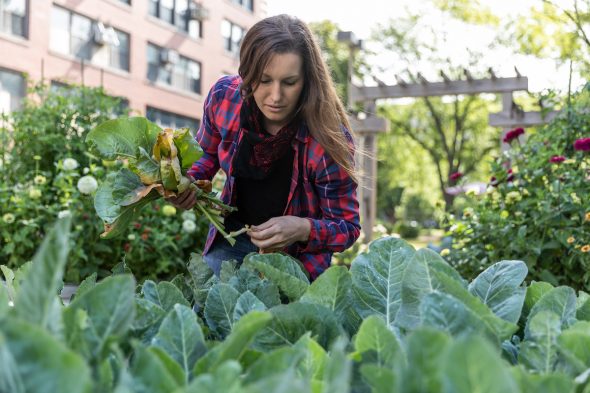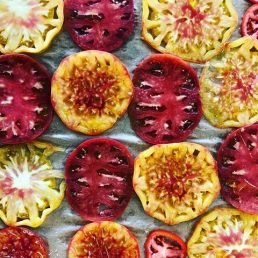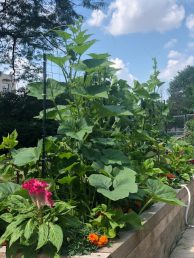Nutritionist designs online curriculum to empower students in their home kitchens

As a registered dietician, manager of the UIC Nutrition Garden and Nutrition-Focused Culinary Instructor and lab manager, Renea Lyles’ approach to her spring and summer sessions was upended by COVID-19, which forced learning to go online.
As a nutrition-focused culinary lab teacher who incorporates lecture components, she had designed her courses to be fundamentally in-person learning experiences, said Lyles, who is in the Department of Kinesiology & Nutrition in the College of Applied Health Sciences.
“Not only do we have a food lab on campus that features six experiential learning kitchens, but we also have the outdoor UIC Nutrition Teaching Garden which is an extension of this classroom,” Lyles said. “I stress the importance of showing up on time ready to work/learn for each class to help students begin to understand the discipline that most work settings require.”
What also contributed to the difficulty of trying to replicate the classes in an online format was that students worked in teams of four in the foods lab space, so it was designed that they must be accountable to one another in addition to themselves.
To help her reinvent the environment in an online learning format she used several tools that helped, including optional discussion boards, a strategically organized Blackboard format and using the Panopto Video content format.
The optional discussion boards allowed students to replicate how they would have learned in a classroom setting by encouraging students to post photos of their lab cooking projects and be able to interact with the other students. While the discussions were optional, she added them on a weekly “To-do checklist” and had 90% to 100% participation among her students. She found that the posts seemed “more honest and genuine” and provided a platform for students to engage.

“One of the important elements of learning in the lab setting is the opportunity to learn from one another’s questions and even mistakes,” Lyles said. “This is lost in the online format, but a discussion board allows students to do this in a genuine way.”
To help keep students on task and aware of weekly expectations, she had asked that the online course template be applied to her course on Blackboard. This allowed her to organize material in weekly folders that included all items that the “student would need to be successful that week.” These included to-do lists, links to content to be viewed, assessments, the submissions site as well as links to the weekly discussion board.
Using the Panopto video format allowed her to include slides to videos that reinforced lessons and allowed her to record and edit using two camera angles, to splice together videos from the garden and food labs where cooking demonstrations were recorded with clear instructions.
While students missed out on the experience of being in the garden and kitchen labs on campus, she used Instagram to bring the garden to them on a platform they viewed for pleasure. This allowed her to share photos and videos of the garden on a daily basis by providing cooking inspiration.
“I also incorporated pieces of my own personal food experiences, stories and previous career as a chef into the lessons. For example, I included a photo of myself ice fishing in Northern Michigan for our lecture on Fish and Seafood,” said Lyles.

Students expressed that they appreciated these verbal and visual anecdotes, which made the online course feel more personal, she said.
Jenny Sher, who is starting her first year toward her Master of Science in Nutrition, took Lyles’ class this summer to prepare her for the fall. It focused on the fundamentals of cooking, getting comfortable in the kitchen, building nutrient-dense meals and learning about different aspects of the food system in the nation.
Sher said what really helped was how Lyles would post the content and recipes and was clear in her expectations and was detailed in her cooking demonstrations as well as in the information she included in her lectures.
“She would post the content at the beginning of the week, which gave us time to structure our week and allowed for a lot of flexibility in completing assignments which was nice. It was also a great way to learn more about UIC including the nutrition teaching garden as we would see her harvest different ingredients for the recipes used each week,” said Sher.
She liked the discussion board that Lyles set up because it built a sense of community and allowed interaction with her classmates who like her were all taking the class remotely. She applauded Lyles for making herself available via remote office hours and email and for her patience.

“I understand online learning often can involve technical difficulties and she was always patient with us in navigating any roadblocks and making sure we were able to submit assignments. Overall, it was a successful summer course that involved a lot of delicious food,” Sher said.
Lyles gave these five tips for students and teachers:
- Plan for technology mishaps and allow time to correct issues.
- Practice using your presentation platform before going live.
- Pre-record lectures and edit them if possible.
- Promote good communication and help students feel comfortable.
- Set ground rules regarding communication.
Among the things she liked about going online was how it helped her embrace new learning technologies and allowed her to give her curriculum another look to best cope with online learning. By having students work in their own homes and kitchens, she felt the new online learning reality was most applicable to students.
“In the end, I think that this online version of the curriculum is better suited to these students and they will be more likely to incorporate these cooking skills and eating patterns into their daily habits,” Lyles said. “I hope that this curriculum helps them to feel empowered in their own home kitchens.”
